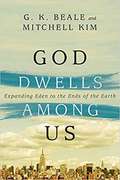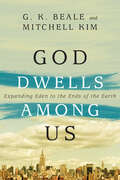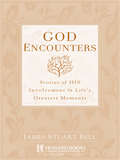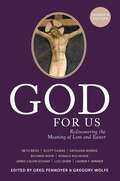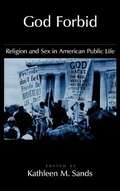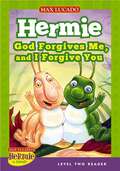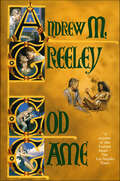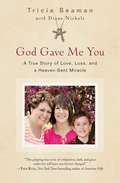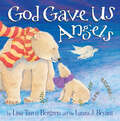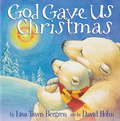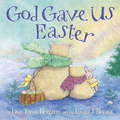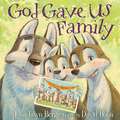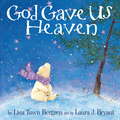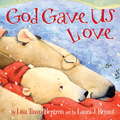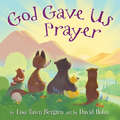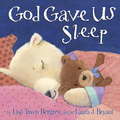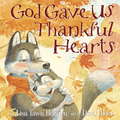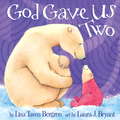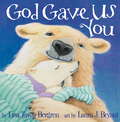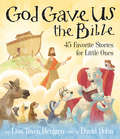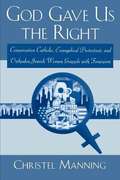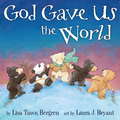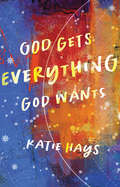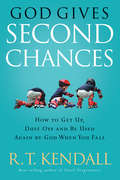- Table View
- List View
God Dwells Among Us: Expanding Eden to the Ends of the Earth
by G. K. Beale Mitchell KimJust like we do today, the writers and chief actors of the Old Testament felt a deep longing for the presence of God. It is symbolized in the temple ruins, and before it the temple itself, and before that the ark of the covenant and the tabernacle that housed it, and before that the Garden of Eden. In response to this longing, God shares his ultimate mission, in which his people play a part: the expansion of Eden, the temple of God's presence, to all peoples throughout the earth. The temple has always been a source of rich scholarship and theological reflection, but what does it mean for the church's ongoing mission in the world?<P><P> G. K. Beale and Mitchell Kim take temple theology off the bookshelf and bring it to our modern-day life, where the church is instructed and exhorted in its purpose. From Eden to the new Jerusalem, we are God's temple on the earth in our day, the firstfruits of the new creation. God has always desired to dwell among us; now the church must follow its missional call to extend the borders of God's kingdom and take his presence to the ends of the earth.
God Dwells Among Us: Expanding Eden to the Ends of the Earth
by G. K. Beale Mitchell KimPreaching's 2014 Best Books for Preachers2014 Best Missions-Oriented Biblical Study, from Byron Borger, Hearts and Minds Bookstore
God Dwells Within Us
by Fr. Thomas DubayA detailed description of the mystery of the Trinity indwelling in the Christian soul
God Encounters
by James Stuart BellWhat does it feel like when God breaks in... ...when He interrupts the logical flow of cause and effect or moves in quietly to answer your prayers? Though you may not see Him with your eyes, you can experience His peace, joy, and comfort as you read this beautiful collection of stories from people just like you -- people whose dreams have been fulfilled, relationships restored, safety protected, and debts paid off. Each faith-building story highlights a particular life-giving characteristic of God, revealing a better understanding of who He is and how much He loves you. Page by page, you'll find yourself growing into a more secure, intimate relationship with Him. If you'd like a peek at God in action, open the pages of this book and witness extraordinary moments in ordinary lives -- in-time encounters with God that left an eternal impact. You, too, can know that He's right there with you -- guarding, guiding, and giving you just what you need at just the right time. If He did it for others, He'll do it for you.
God For Us: Rediscovering the Meaning of Lent and Easter (Reader's Edition)
by Kathleen Norris Luci Shaw Ronald Rolheiser Richard Rohr Scott Cairns Lauren F. Winner Gregory Wolfe James Calvin Schaap Greg Pennoyer Beth BevisA daily devotional reader to guide lovers of the Word through the forty days of Lent and Easter, rich with spiritual insight from leading Catholic, Protestant, and Orthodox writersExplore the meaning of Lent, its importance in spiritual formation, its significance in the preparation for Easter, and throughout the holy season of Christ's Resurrection. Leading North American spiritual writers reflect on what one theologian has called the "bright sadness" of Lent: that it is not about feeling broken and lost, but about cleansing the palate so we can taste and live life more fully. During Lent and Easter, we encounter the God who in all of life is for us—for our liberation, for our healing, for our wholeness. Even in death we can find resurrection.In God For Us readers will find:- Daily readings with scriptures, meditations, and prayers, beautiful edited by Greg Pennoyer and Gregory Wolfe- One beloved spiritual writer featured each weekIntroduction: Fr. Ronald Rolheiser, OMIShrove Tuesday and the First Week of Lent: Richard Rohr, OFMSecond Week of Lent: Lauren F. WinnerThird Week of Lent: Scott CairnsFourth Week of Lent: James SchaapFifth Week of Lent: Luci ShawHoly Week and Easter: Kathleen Norris- Studies throughout the forty days on "The Feasts and Fasts of Lent" by Beth Bevis
God Forbid: Religion and Sex in American Public Life
by Kathleen M. SandsSince the 1980s, religion has been most visible in American public life when issues of sexuality and reproduction are at stake. Paradoxically, however, the voices that speak most loudly in the name of religion are often unschooled in religious history, world religions, theology, or ethics. As a result, religion in America is misrepresented as anxiously and obsessively concerned with sex, and as uniformly supporting the conservative agenda of "family values." This volume corrects that distortion in American public discourse. Its thirteen previously unpublished articles introduce scholarly perspectives on issues including the family, gay rights, abortion, welfare policy, prostitution, and assisted reproduction. They richly display the complexities and conflicts that exist not only between but within America's various religious traditions--for example, the pro-choice strain within Christian history, the support of many religious denominations for gay rights, and the criticism of patriarchal family structures within religious communities past and present. In these essays, contributors put forth views of sexual ethics that are just and compassionate, respectful of cultural pluralism, and attentive to democratic processes. Thoroughly researched, lucidly written, and carefully argued, this anthology will debunk the claims of the Religious Right to be the only "religious" word on sexuality in America.
God Forgives Me, and I Forgive You (Max Lucado's Hermie & Friends)
by Max LucadoHermie learns the importance of offering forgiveness and discovers how incredible God's grace really is. There is a lot of excitement in the garden as all the bugs prepare for the harvest festival. Hermie has promised to help Wormie but then forgets. Luckily, Wormie is quick to forgive Hermie. But later when Hermie is the one who is disappointed, will he be able to forgive too? God gently reminds Hermie that God continues to forgive us when we make mistakes, and it's important that we do the same for others. The third title in the Hermie & Friends® Level 2 Reader series, this book is perfect for beginning readers who need to build their confidence and still enjoy fun illustrations. Plus, parents are pleased to know that the story reflects the concepts taught in Jesus' parable of the unforgiving servant (Matthew 18) and teaches young readers about God's grace and forgiving others.
God Game
by Andrew M. GreeleyAndrew M. Greeley, the phenomenally popular novelist and priest, is best known--and loved--for his understated Catholic morality and compassionate understanding of human foibles. In The God Game, now available in a brand-new trade paperback edition, Father Greeley takes a new and fascinating twist on an old cliche: What if -- by using a sophisticated computer game with a healthy dose of heavenly intervention -- you really could play God? What if you actually had the power to control other people's lives?This is the dilemma that faces our hero, who quickly finds that being given the kingdom, the power, and the glory is dangerous -- but addictive. The troubles of the people he sees flashing on his computer screen are all too real -- and his troubles are just beginning. . .At the Publisher's request, this title is being sold without Digital Rights Management Software (DRM) applied.
God Gave Me You: A True Story of Love, Loss, and a Heaven-Sent Miracle
by Tricia Seaman Diane NicholsWhen a single mother with terminal cancer asked a nurse she’d met in the oncology ward to raise her son, neither could have imagined the miracles God had in store.God Gave Me You tells the true story of how these two incredible mothers met, the immediate bond they formed, and the ups and downs of joining families as one’s earthly life ebbed away. The miracle of these two families coming together demonstrates that family isn’t always blood—sometimes it’s made up of the people God gives you if you have a willing heart. Oncology nurse Tricia Seaman and her family had their hearts set on adopting a son. They were months into the grueling process when Tricia met a terminally ill cancer patient on her regular rounds. Curiously, the two shared the same name. Trish Somers was that patient—a single mom whose world revolved around her eight-year-old son, Wesley. As the young mother poured out her fears and emotions during her post-operative care, Tricia sensed theirs would be like no other nurse-patient relationship she had experienced in her career. When the cancer spread, it became clear Trish had only a short time left to live. That’s when the inconceivable happened: Trish asked her nurse—a woman who had been a complete stranger just days before—to raise her beloved son when she passed away. God Gave Me You will inspire you with a story of courage, trust, and faith that God’s plans are bigger and more amazing then we could hope for on our own. It’s a story you’ll turn to again and again when you’re looking for hope and a reason to believe in miracles.
God Gave Us Angels: A Picture Book
by Lisa Tawn Bergren Laura J. Bryant"What do angels do all day, Papa?" When Papa finds Little Cub looking for angels, it gives him a chance to tell his beloved child about those that may be in their midst, even when they can't be seen. Exploring their exhilarating Arctic world as they talk, Papa lovingly answers all of Little Cub's questions about angels--and as usual, she has a lot. She wants to know what they do, how they look, how they guard God's loved ones, and best of all, how they serve the Creator of the world. "God really created angels to serve him more than us, Little Cub.They love him and would do anything for him." This uplifting tale will encourage young hearts by exploring the glory and design of God's messengers, while turning toward him with praise. Also available: God Gave Us YouGod Gave Us Two God Gave Us Christmas God Gave Us HeavenGod Gave Us LoveGod Gave Us the WorldGod Gave Us Easter Over two million copies in the series sold!
God Gave Us Christmas (God Gave Us Series)
by Lisa Tawn Bergren David HohnAs Little Cub and her family prepare to celebrate the most special day of the year, the curious young polar bear begins to wonder... "Who invented Christmas?" Mama's answer only leads to more questions like "Is God more important than Santa?" So she and Little Cub head off on a polar expedition to find God and to see how he gave them Christmas. Along the way, they find signs that God is at work all around them. Through Mama's gentle guidance, Little Cub learns about the very first Christmas and discovers that... Jesus is the best present of all. This enchanting tale provides the perfect opportunity to help young children celebrate the true meaning of Christmas and to discover how very much God loves them.From the Hardcover edition.
God Gave Us Easter (God Gave Us Series)
by Lisa Tawn Bergren Laura J. Bryant"God loved us so much he wanted us to always be with him too. That's why God knew he'd need to give us Easter." As Little Cub celebrates Easter with Papa, Mama, and her brother and sister, she begins to ask her papa questions about this very special day of the year. Papa lovingly explains God's plans for his children, while taking Little Cub on a memorable walk through her stunning Arctic world, and he shares how Easter came about in clear, simple terms that even the littlest cubs can understand.
God Gave Us Family: A Picture Book
by Lisa Tawn Bergren David HohnLittle Pup’s wolf family is on their way to a special reunion—with lots of cousins, games, roasting marshmallows, and fun! As the young wolf thinks about different kinds of families, it’s the perfect opportunity for Mama and Papa to teach their inquisitive child about the families that God brings together. Some families are big and others are small, some are led by grandparents or just one parent, and some families include adopted little ones– yet each family is truly special. Even the members of Little Pup’s pack make up an important role in his family, although they sometimes pester him. Papa gently reminds his son… “We need to love the family God gave us.” A heartwarming and colorful addition to the best-selling God Gave Us series, this tale will delight young hearts and help them understand how families of all types reflect God’s unconditional love.
God Gave Us Heaven
by Lisa Tawn Bergren Laura J. BryantAs the sun rises on her snow-covered world, Little Cub wonders aloud..."What is heaven like?"With tender words, her Papa describes a wonderful place, free of sadness and tears, where God warmly welcomes his loved ones after their life on earth is over. Little Cub and Papa spend the day wandering their beautiful, invigorating arctic world while she asks all about God's home: How do we get to heaven? Will we eat there? Will I get to see you in heaven? Papa patiently answers each question, assuring her that..."Heaven will be full of everything good."This gentle story provides satisfying answers for a young child's most difficult questions about what happens after this life, inviting "little cubs" to find comfort in knowing that God Gave Us Heaven.Also available:God Gave Us YouGod Gave Us TwoGod Gave Us Christmas
God Gave Us Love (God Gave Us Series)
by Lisa Tawn BergrenAs Little Cub and Grampa Bear's fishing adventure is interrupted by mischievous otters, the young polar bear begins to question why we must love others... even the seemingly unlovable. In answering her questions, Grampa Bear gives tender explanations that teach Little Cub about the different kinds of love that is shared between families, friends, and mamas and papas. Grampa explains that all these kinds of love come from God and that it is important to love others because..."Any time we show love, Little Cub, we're sharing a bit of his love."This sweet tale will warm the hearts of young children as they learn about all the different sorts of love, while the gentle explanations of each provide a valuable opportunity to encourage children to share with others a "God-sized love."
God Gave Us Prayer
by Lisa Tawn BergrenFrom the creator of God Gave Us You, God Gave Us Christmas, and God Gave Us Easter comes a story that teaches young readers how to talk with God about anything that's on their mind.Little Pup discovers Mama sitting silently by the lake, praying. But what does that mean? And how does Little Pup go about praying to God? And what do you say to God? Little Pup's questions spill out as he and Mama walk through the woods. Mama patiently helps Little Pup learn the importance of prayer, forgiveness, gratefulness, and compassion toward others. With guided prayers for children to use and inspiration to help them create their own, God Gave Us Prayer gently models the ACTS method of prayer: adoration, confession, thanks, and supplication. In the familiar voice that millions have grown to trust from her God Gave Us series, Lisa Tawn Bergren introduces kids to the power of prayer.
God Gave Us Sleep
by Lisa Tawn Bergren Laura J. Bryant"Little Cub!" Mama called. "Time for bed." Little Cub is having so much fun building an igloo with her friends that she doesn't want to stop for bedtime! Who needs sleep when there's fun to be had? Mama patiently answers her child's questions as she puts her to bed, explaining the importance of daily rhythms of work, play, and rest. As they talk through the fears that come with nighttime--and work through Little Cub's endless stalling tactics--our favorite bear learns to realize that God gave us sleep as a vital gift. "God gave us rest so we have energy for our day, and patience to enjoy it. And so we have quiet time to listen to him." This charming addition to the best-selling God Gave Us series, with its Arctic characters and relevant message, will help all little ones prepare for a peaceful night's rest.From the Hardcover edition.
God Gave Us Thankful Hearts
by Lisa Tawn Bergren David HohnAdventurous Lil Pup is bummed that hibernating season will soon be coming to the Great North Woods. Why should so many of his friends have to go in for the winter and leave Lil Pup without pals? Mama reminds her little wolf that not all animals hibernate, and how he can be grateful for the beautiful autumn season - for jumping in leaf piles, eating apple treats, and celebrating the wonders of fall with his forest friends. And she points out..."I think the trick to having a thankful heart is thinking about the things that make us happy, rather than the things that don't."As Mama and Lil Pup explore, she reminds him that God is the giver of all good things. Lil Pup learns that even when something fun comes to an end; his heart can be thankful when he sets his mind on the best things in his life.This inviting addition to the best-selling God Gave Us series, with nearly 2.5 million books sold, helps little ones to understand how giving thanks warms hearts and brings joy.From the Hardcover edition.
God Gave Us Two
by Lisa Tawn Bergren Laura J. BryantNow that Mama polar bear has another baby in her tummy, Little Cub is bursting with curiosity. "Why do we need a new baby?" she asks. "If we don't like the new baby, can we send it back?" "Will you forget me when the new baby comes?"Gently and lovingly, Mama and Papa assure their firstborn that the new baby is a gift from God they want very much, just as Little Cub was-and still is. "God gave us you. Now he's given us two!"The winsome sequel to God Gave Us You, God Gave Us Two playfully affirms a child's uniqueness and place in the family and helps little ones accept, appreciate, and love their new siblings.
God Gave Us You
by Lisa Tawn Bergren Laura J. BryantWhen a charming polar bear cub climbs into bed one night, she asks her Mama a very important question--one that little "human cubs" often wonder about, too: "Where did I come from?"As Mama bear tucks her youngest cub under the quilts, she gently, tenderly, and reassuringly communicates the message loving parents everywhere (bears and non-bears alike) want their little ones to hear: "We wanted you very, very much, and we are so very glad because--God gave us you." Perfect for bedtime, naptime, storytime or anytime, God Gave Us You provides a valuable opportunity to build children's self-esteem every day and assure each one that he or she truly is a welcomed, precious, and treasured gift from the Lord. Also available in the God Gave Us series:God Gave Us TwoGod Gave Us ChristmasGod Gave Us HeavenGod Gave Us LoveGod Gave Us So MuchFrom the Hardcover edition.
God Gave Us the Bible: Forty-Five Favorite Stories for Little Ones
by Lisa Tawn BergrenIntroducing a Bible storybook from the creators of God Gave Us You, God Gave Us Christmas and God Gave Us Easter, featuring 45 stories from the Bible, with reflections from adorable Little Cub and her friends.God Gave Us the Bible introduces kids to the STORY of stories--the love story between God and his people. Ideal for readers aged 3 to 7, written in a framework where Little Cub and her animal friends reflect many of the questions young readers have about Bible stories. The book features forty-five Bible stories and concepts that every child should know/be introduced to, like Noah and the Ark, the Birth of Jesus, and Jesus Feeds the 5,000 in a very warm, conversational, reassuring manner.
God Gave Us the Right: Conservative Catholic, Evangelical Protestant, and Orthodox Jewish Women Grapple with Feminism
by Christel J. ManningDrawing on two years of ethnographic research in Catholic, Evangelical Protestant, and Jewish communities, the author explores the diversity of views among women who have returned to tradition. Arguing that America has undergone profound cultural and economic changes in the last 30 years that have created tension between women's lives and traditional gender roles, she demonstrates how religious conservative women negotiate these tensions. Manning is an assistant professor of religion at Sacred Heart University. Annotation c. Book News, Inc., Portland, OR (booknews.com)
God Gave Us the World: A Picture Book (God Gave Us Series)
by Lisa Tawn Bergren Laura J. BryantLittle Cub's trip to a special museum exhibit, "Bears Around the World," sparks a flurry of questions from the young polar bear who is just beginning to learn about life beyond her North Pole home. As Mama Bear shares with her about the different types of places that God has put the various types of bears, with their different kinds of fur and food, Little Cub begins to wonder: Why didn't God make us all the same? With Mama's loving guidance, Little Cub is taught to see the vastness of God's wonderful creation; His abilities as an amazing, inventive Creator; His desire for us to care for our world, and especially the important lesson that... "Every bear has a special place in God's great, big world." This adorable story offers young children who are discovering their place in God's big world an opportunity to learn about the wonder of diversity, the gift of creativity, the importance of caring for His gifts, and how each child-each creation-is special to God. Also Available: God Gave Us YouGod Gave Us TwoGod Gave Us ChristmasGod Gave Us HeavenGod Gave Us LoveGod Gave Us So Much - a limited three book treasuryFrom the Hardcover edition.
God Gets Everything God Wants
by Katie HaysA gospel of hope, inclusion, and defiance If God gets everything God wants, and if what God wants is you, can anything stand in God&’s way? Too many Christians have been taught that core aspects of who they are—their gender, their sexual orientation, their politics, their skepticism—prevent God from loving them fully. For these individuals, church has been a painful experience of exclusion, despite the reality that Jesus was the embodiment of God&’s radical inclusion. Katie Hays invites weary Christians, former Christians, and the Christ-curious to take another look at God through the testimony of our biblical ancestors and to reimagine the church as a community of beautiful, broken, and burdened people doing their best to grow into their baptisms together. Hays insists that yes, God does get everything God wants, and—even better—we&’re invited to want what God wants, too, and want it &“more and more and more, until life feels abundant and eternal and delicious and drunken with possibility.&” This is a message of stouthearted faith anchored in wonder—not false certainty. Atheists are welcome. Those who feel uneasy inside a church are welcome. Those still angry at other Christians are welcome. Because no matter what we&’ve experienced, the God who still adores this world is the God of hope, inclusion, and defiance of the powers that be. And for those who are willing to collaborate in &“the painstaking work of examining our Christian faith and sorting it out—the good stuff from the harmful stuff, the stuff with integrity from the stuff we simply inherited from family or church or . . . the cultural air we&’re breathing&”—there await life-giving possibilities found nowhere else.
God Gives Second Chances: How to Get Up, Dust Off and be Used Again by God when You Fall
by R. T. KendallKendall looks at wrongdoing and the judgment of ministry leaders and laypeople, assuring those who've fallen that they can be used again--and warning those who condemn them. Exploring his own vulnerabilities, he presents a compassionate, biblically balanced case for a God of second chances.
